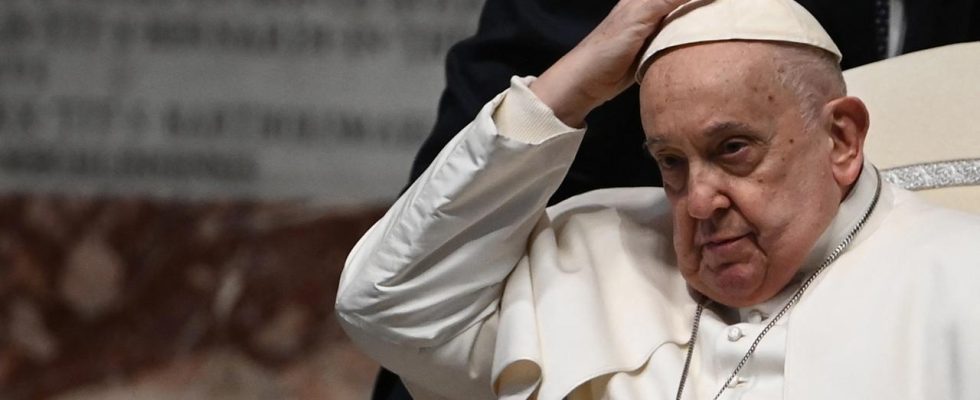The Pope has called on Ukraine to have the courage to negotiate peace with Russia – and has met with strong international opposition. The Vatican is trying to limit the damage.
The Pope has met with international criticism for his statements that Ukraine must have the courage to negotiate peace with Russia. Bundestag Vice President Katrin Göring-Eckardt clearly contradicted the appeal. “Nobody wants peace more than Ukraine,” said the Green politician to the Editorial Network Germany (RND). There has been war on Ukrainian territory for ten years and countless people have been killed.
However, Göring-Eckardt added: “It is Vladimir Putin who can immediately end the war and the suffering – not Ukraine. Anyone who demands that Ukraine simply surrender is giving the aggressor what he has illegally taken and accepts the annihilation of Ukraine.” Göring-Eckardt emphasized: “Peace will and must be negotiated – but on an equal footing.”
“Why in God’s name doesn’t he condemn the incitement?”
The FDP defense politician Marie-Agnes Strack-Zimmermann also criticized the Pope. “Before the Ukrainian victims raise the white flag, the Pope should loudly and unmistakably call on the brutal Russian perpetrators to take down their pirate flag – the symbol of death and Satan,” said the chairwoman of the Bundestag Defense Committee to the Funke newspapers Media group.
“And why in God’s name doesn’t he condemn the verbal, murderous incitement of Cyril I, head of the Russian Orthodox Church and ex-KGB agent, against the Ukrainian people?” asked the 66-year-old. “As a Catholic, I’m ashamed that he doesn’t do that.”
Poland’s Foreign Minister Radoslaw Sikorski also found clear words: “How about encouraging Putin to have the courage to withdraw his army from Ukraine to compensate? Then peace would come immediately without negotiations being necessary,” wrote Sikorski on the Platform X
Pope spoke on Swiss television
The Pope said in an interview on Swiss television published in advance at the weekend: “When you see that you are defeated, that things are not going well, you have to have the courage to negotiate.” Without directly naming either of the two parties to the conflict, Russia or Ukraine, he added that without negotiations the situation could become even worse, which is why we should not be ashamed of that.
In the interview, Francis is also asked about demands from Ukraine for “the courage to surrender, to raise the white flag,” which others see as legitimizing the stronger side. To this the Pope answers in general: “It’s a question of perspective. But I think that the stronger is the one who recognizes the situation, who thinks about the people, who has the courage of the white flag to negotiate.”
Ukraine reacts angrily
In Ukraine too, the term “white flag” used by the Pope was directly understood as a call to surrender and immediately triggered angry reactions. “It seems strange that the Pope does not call for the defense of Ukraine, does not condemn Russia as an aggressor that is killing tens of thousands of people,” wrote former MP and Deputy Interior Minister Anton Herashchenko on Network X.
The former Ukrainian ambassador to Austria, Olexander Scherba, called the Pope a “believer of little faith” using a word from the Bible.
Kiev officials did not comment. From previous Pope statements, Ukrainians have the feeling that Francis has more understanding for Russia than for their attacked country.
Vatican around Damage limitation engaged
The Vatican then tried to limit the damage and tried to classify the Pope’s statements. Pope spokesman Matteo Bruni contradicted reports that the Pope had called on Ukraine to surrender in the interview. He wanted “above all to call for a ceasefire and to revive the courage to negotiate.”
The Swiss journalist Lorenzo Buccella met with the Pope at the beginning of February. The main topic of their conversation: the meaning of the color white, the color of good, of light – but in which dirt and blemishes also appear particularly clearly. What was actually a philosophical interview quickly turned into a political one – including about the war in the Middle East.
Asked whether he had offered himself as a mediator, Francis replied: “I am here, quite simply. I sent a letter to the Jews of Israel to reflect on this situation. Negotiation is never surrender. It is courage “Not to lead the country to suicide.”
The interview will be broadcast in full length on March 20th on the Swiss radio station RSI.
With information from Verena Schälter, ARD Rome
Verena Schälter, ARD Rome, tagesschau, March 10, 2024 5:49 a.m

